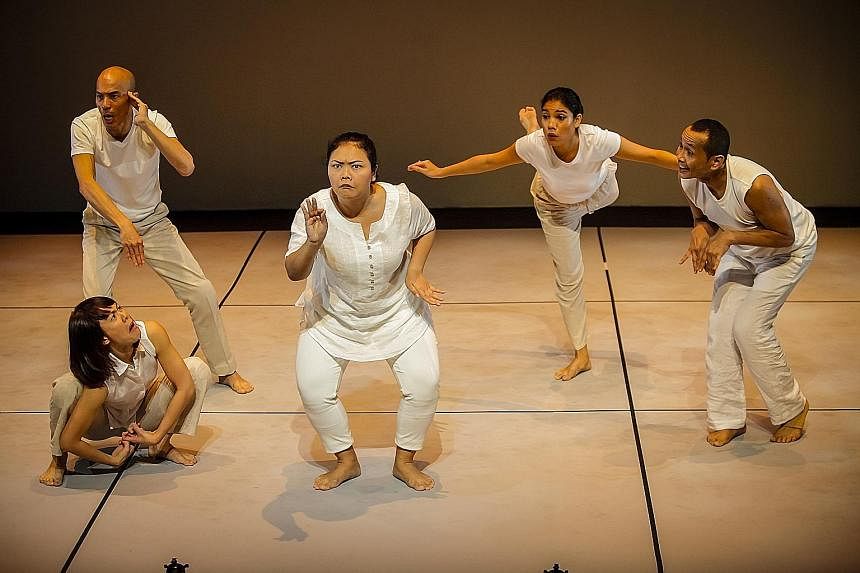Review Theatre
ANOTHER COUNTRY
Wild Rice
Drama Centre Theatre
Last Saturday
Exactly 10 years ago, Wild Rice established a two-way literary highway between Singapore and Malaysia by way of Second Link, a clever theatre exercise so simple and elegant in its execution that it left many wondering why it had not been done before.
Singaporean actors performed a curated selection of Malaysian texts and the Malaysians sank their teeth into a meaty slab of Singapore literature.
The result was a startlingly emotional one, and 10 years later, the year of Singapore's amped-up Golden Jubilee, Wild Rice has decided to revisit this cross-Causeway collaboration in Another Country.
-
Book it
-
ANOTHER COUNTRY
Where: Drama Centre Theatre, National Library Building Level 3
When: Till July 11 (Tuesday to Saturday, 8pm; Saturday and Sunday, 3pm)
Admission: $40 to $75 from Sistic (call 6348-5555 or go to www.sistic.com.sg)
Some of the texts are echoes of the past, others bring a fresh edge to the mix, but the result is largely a delightful, thoughtful sampler platter of the riches both countries have to offer, both on the page and on stage.
The production opens with playwright Alfian Sa'at's selection, Sayang Singapura, 35 pieces that range from letters to the press demanding exemption from national service in the 1960s or tussling over the fate of street hawkers in the 1920s; to fragments of poems, novels, plays and short stories.
Performed by the immensely likeable Malaysian cast of Anne James, Ghafir Akbar, Sharifah Amani, Iedil Putra and Alfred Loh, the texts are both a potted Singapore history from the 15th century to the present, as well as a many- splendoured prism reflecting on shared languages, the nudge-wink way one country views the other, and the darker under-belly of politics.
There is a celebration of Singapore in the 1950s, pre-independence, as the sort of cosmopolitan, chic neighbour to its northern kampung sibling in R. Azmi's Kalau Datang Ke Singapura, echoed later in Alfian's own short story, A Visit To A Relative's House In Malaysia, where the narrator looks on his rural relatives as simple-minded, blind to his own ignorance as a city-slick visitor. Then there is Claire Tham's excellent Highway, an account of a Malaysian highway patrolman attempting to get a bribe from the Singapore driver of an envy-inducing BMW, a familiar situation that encapsulates the unique, umbilical relationship between both countries - at once jealous of and dismissive of the other, loved and hated, embraced and discarded.
This goes beyond the affectionate slip-ups in intonation when the Malaysian cast performs Dr Leong Liew Geok's Forever Singlish, with a slight lilt that immediately betrays - to both Malaysians and Singaporeans - which side of the peninsula the speaker comes from.
Singapore's multilingual heritage works on both sides of the Causeway, as it does in Kuo Pao Kun's landmark Mama Looking For Her Cat, Singapore's first multilingual play. The outstanding Anne James speaks in Tamil and Loh, as a curmudgeonly old man, in Hokkien, and we understand both of them perfectly from beginning to end.
One of my personal, quieter favourites was seeing Ghafir standing on stage, alone, delivering an excerpt from Gopal Baratham's novel, Sayang. For me, the effect was electric: "It was a truly South-east Asian word, soft as its people and well-understood from Marang to Manila, Surabaya to Sulawesi, Kuala Lumpur to Kota Kinabalu."
The word "sayang", so often used on both sides of the Causeway, immediately brought me back to a recent tragedy that bound both countries together, the June 5 Sabah earthquake that claimed lives from both countries at Mount Kinabalu.
The text continued: "It describes a love bound to sadness, a tenderness trembling on the edge of tears... It was hugging an infant and knowing that its happy, gurgling flesh could not escape suffering and death." How is it that one word, to all of us, can mean so much?
The politics of race came much more strongly to the fore in the Malaysian selection by Leow Puay Tin, of which only about 80 per cent was performed due to the deliberate restriction of time.
The Singapore cast of Janice Koh, Siti Khalijah, Lim Yu-Beng, Gani Karim and Sharda Harrison gave themselves just an hour to sprint through as many scenes as possible, arranged in random order with the "help" of the audience. Hence the title, Tikam-Tikam: Malaysia@Random 2.
It felt almost "Singaporean" to set a countdown ticker as the scenes were performed, a sideways nod to our obsessions with efficiency and keeping time.
While personally less familiar with the contextual significance of the Malaysian literary work, I was struck by the repeated motifs that came to light - the shared folklore, the entwined histories drawn from the Malay Annals, one inextricable from the other. Where does Singapore begin and Malaysia end? We even share our beloved chicken rice.
And yet the divisions are also incredibly clear: as a toilet cleaner squats on the floor in Leow Puay Tin's Ang Tau Mui and stuffs herself with pork, we are immediately aware of the reversal of racial minorities and majorities. In the segment Who's Bad?, an interview with actor Adlin Aman Ramlie over a TV spot for a National Courtesy & Noble Values Campaign by the late Yasmin Ahmad might have been innocuous in Singapore, but it was controversial in Malaysia for portraying a Malay man as decidedly discourteous, refusing to give up his seat to an elderly commuter on the LRT.
As with all patchwork quilts, some scenes are stronger than others. A segment on the late opposition political figures Lim Chin Siong and Francis Khoo felt clunky; a song by political exile Khoo, in particular, performed with such pathos in Tan Pin Pin's film To Singapore, With Love, was interpreted literally on stage here, clumsily spelling out every gesture and image, when the song was so much more powerful in the spotlight alone.
The production is a sprawling one at nearly three hours, but co-directors Ivan Heng and Jo Kukathas keep their ensembles going at a quick pace, with enough new material at every turn to keep the marathon going at a good clip.
Perhaps due to his larger selection of texts, Alfian's half felt like a systematic examination of cross-cultural links, while Leow's felt more like a teaser of things to come, where the audience is left to shade in the areas left unmarked on their own. Both work in different ways, emphasising perhaps subconsciously the "Singaporean" need for order and the "Malaysian" tolerance for chaos.
But together, they have pieced together a larger puzzle of how these two countries fit together on maps both physical and emotional. Another Country captures how far apart both nations have drifted from each other, and yet how close they remain, trading both barbs and bouquets in the same breath, as well as laughter and tears.


